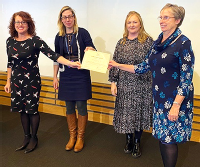Supporting women’s health in the workplace and beyond

In October 2021, the University of Warwick held its first Equality, Diversity and Inclusion awards, with Warwick Medical School achieving a ‘highly commended’ for its work led by the Women’s Health and Menopause Group. Here we explore the group’s projects and what it hopes to achieve moving forwards.

Before the pandemic began, Warwick Medical School ran an annual Health and Wellbeing Day with the School of Life Sciences, where colleagues and students took time out of their day to try new wellbeing activities and find out about support on offer at the university and externally. It was at these events and in the feedback afterwards that organisers first became aware of a real desire among members of the community to have better access to support around women’s health issues, and in particular the menopause.
As a response to this feedback, in 2019 the WMS Women’s Health and Menopause Group was set up, led by Sarah Hillman, GP and clinical lecturer; Marsha Hughes, HR Business Partner; and Rosemary Cragg, Divisional Support Officer. “As a doctor I speak to many women that are affected at work by women’s health problems such as the menopause”, says Sarah. ”I wanted to be involved to help support staff at WMS. Working alongside Rosemary and Marsha means we can bring together our professional skills to complement each other with ideas for the group.”
Focusing initially on the menopause, the group launched its work with an online seminar in the autumn of 2020, attended by over 200 members of the WMS community. Delivered by national menopause experts, the event covered the symptoms of menopause, its importance for current and future health, and ways of treating and managing symptoms. The group received fantastic feedback about the event, with women expressing how enlightening the webinar had been and how it had encouraged them to have further conversations and reach out for help.
Following the success of the menopause seminar, the group set up a virtual ‘Menopause Café’, a friendly and informal fortnightly meetup. Marsha, who leads the sessions, explains “It’s for women and men to join and is a drop-in chat room to share experiences and talk about the menopause, since it affects so many of us. There are 34 listed symptoms, from headaches and mood swings to some quite serious health concerns, so it really helps to talk about these issues. I’m not clinical but have a personal interest in women’s health and, working in HR, I’ m used to dealing with women who are having menopausal symptoms and struggling in the workplace. I’m really passionate about supporting people through the menopause journey.”
Recently the group has expanded its focus to include other women’s health issues, and has launched an emergency sanitary initiative, providing free sanitary products in toilets across the Gibbet Hill campus. Rosemary, who has been managing the initiative, says “Previously, although emergency sanitary products were available at Warwick Medical School, these were only accessible by cash, and as we are now moving to a cashless society it was becoming increasingly difficult to use the machines. We also have many colleagues and students on campus outside of office hours, checking experiments in the labs for example, when there might be no retail areas open to get change. Our new initiative has had a great reception and in order to make it self sustaining, we have simply asked that people replace the products with items from home when they are able to.”
So what’s next for the group? Menopause workshops and training is a priority, with plans for separate sessions for those affected and for line managers. These will cover how to manage symptoms, what line managers need to know and how they can support staff. There will also be support for managers on how to deal with sensitive conversations, and information about employment law and work placement adjustments.
And as an ongoing piece of work, the group is keen to make the most of being part of a medical school to help educate the next generation of doctors to support women’s health issues. “We endeavour that our aims and standards are reflected in the way we teach and encourage our future doctors to prioritise women’s health,” explains Sarah. “A key goal for us is to encourage all of our students to be the medical feminists that not only our medical school but also our patient population needs them to be.”

